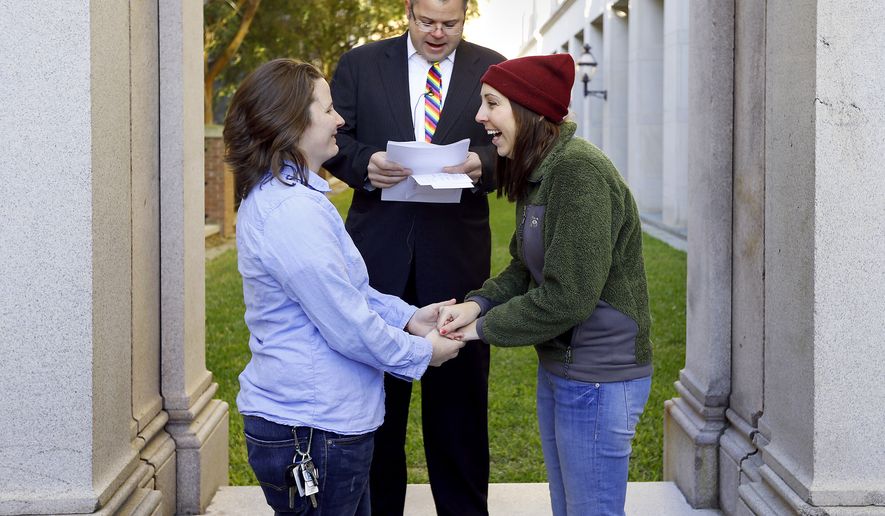A bid to maintain South Carolina’s man-woman marriage law ended Thursday when the Supreme Court declined to continue a stay blocking same-sex nuptials.
However, South Carolina Attorney General Alan Wilson said Thursday that this was not the last word on the marriage issue.
“Despite today’s refusal to grant our motion, the U.S. Supreme Court has not yet resolved conflicting rulings by federal appeals courts on the issue of same-sex marriage,” Mr. Wilson said. “When the U.S. Supreme Court decides to consider the case, our office will be supporting the position of the 6th Circuit Court of Appeals, which is more consistent with South Carolina state law, which upholds the unique status of traditional marriage.”
Chief Justice John G. Roberts Jr. had this week received the request to stay a ruling legalizing gay marriage in South Carolina from Mr. Wilson.
The high court issued its order Thursday morning, with Justices Antonin Scalia and Clarence Thomas dissenting.
The order meant that a stay on the marriages in South Carolina lifted at noon.
On Wednesday, one probate court judge in Charleston began issuing licenses even before Justice Roberts responded.
The decision in South Carolina means at least 33 states now permit same-sex couples to marry.
Many of these states saw their man-woman marriage laws overturned because they were under the jurisdiction of a federal appellate court that ruled in favor of gay marriage. To date, the Supreme Court has declined to intervene in these cases.
Officials in several states affected by federal appellate court rulings are continuing to fight to keep their man-woman marriage laws, which were all approved by voters about a decade ago.
In Montana, a federal judge struck down the state’s marriage law on Wednesday. U.S. District Judge Brian Morris did not stay his ruling, and several same-sex couples married later that day.
Montana Gov. Steve Bullock, a Democrat, welcomed the ruling, but Montana Attorney General Tim Fox, a Republican, said he would appeal it to the 9th Circuit, which has already upheld gay marriage for its region.
In Kansas, the Supreme Court also recently declined to keep a stay on a decision that legalizing gay marriage in a few counties in Kansas.
Gay marriages are commencing in those Kansas counties, but state Attorney General Derek Schmidt is continuing to argue that the order does not apply to all of Kansas’ 105 counties.
“Because a provision in the Kansas Constitution is at peril, the state of Kansas will continue its defense in federal court as long as a defense is properly available,” Mr. Schmidt said.
Separately, officials in Idaho and Alaska — where gay marriage is permitted now due to a 9th Circuit ruling — are seeking an en banc review of their cases, while a Hawaii lawmaker has been granted a rehearing in December by the Hawaii Supreme Court on the gay marriage law there.
The remaining 15 states that do not permit gay marriage are in the 5th, 6th, 8th and 11th Circuit Courts of Appeal. All are engaged in court battles over gay marriage.
• Cheryl Wetzstein can be reached at cwetzstein@washingtontimes.com.




Please read our comment policy before commenting.